Mono updates
I answered a few questions for Howard Wen from O'Reilly on Mono, it covers some of the progress that we have done recently, the interview is: here
Posted on 22 Mar 2005
Sad News
Francisco, one of Mono's key contributors lost his son in Iraq yesterday while he was on a patrol operation.
Our sorrows are with Paco and his family.
One of my pending email was a follow up to an email from Paco to his son a few days ago. Paquito was looking forward to come back and continue composing music and continue his graphics design work. He was composing and mixing music from the barracks on his spare time.
Update: Corrected the link above.
Posted on 21 Mar 2005
MonoDevelop
Lluis has a nice summary of the progress in MonoDevelop.
Posted on 19 Mar 2005
Beirut
Coming to Beirut was a revelation, because it is completely different from what you imagine. I consider myself informed on the Middle East and on its political situation, but I was still a little bit scared of visiting Lebanon.
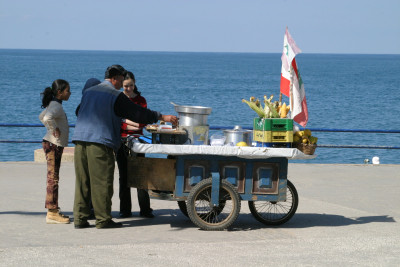
In the Corniche.
Edd and Yuyu both e-mailed me and told me that it was worth visiting and they eased my fears. Then I talked for a few weeks with Alaa and Hisham from the Lebanon Linux Users Group and they answered all of my pressing questions on Beirut.
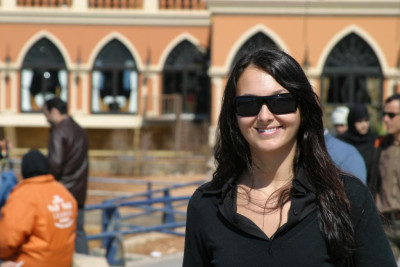
Laura in the Corniche
Turns out that Beirut today is a very safe city just like any other american or european city. What makes the trip interesting is the new language and arabic scripts.
I went to Beirut after reading Robert Fisk's Pity the Nation. The book is similar to reading The Thousand Nights and a Night, it is packed with stories that span roughly fifteen years in the life of Lebanon and the civil war.
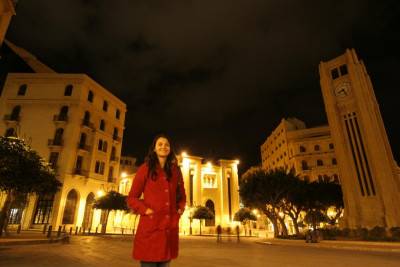
Downtown Beirut.
I got a haircut in Beirut. My barber asked me what I was doing there. `I am here because I read Pity the Nation' was my standard answer during my trip. He then said, ``I used to cut Mr. Robert Fisk's hair in the 80's during the civil war, he and the others staying at the Commodore Hotel''. He gave me his business card.
While in Beirut, we had the pleasure of meeting with Robert Fisk for lunch:
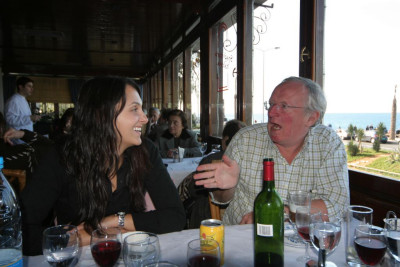
Laura and Robert at Lunch.
I had attended one of his lectures at MIT a few years ago, being a fan of his writing. But meeting him and Victoria for lunch was a pleasure, not only we had a great conversation, but the conversation had so much information that when I got back to our hotel I took pages of notes on what I had learned.
I told Robert the story about the guy who cut my hair, and showed him the business card. He said `Oh, yes, I remember him; I have now a new barber'.
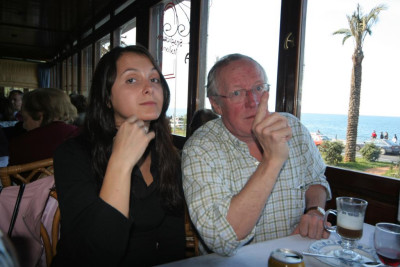
Posing for the camera.
Our friends in Lebanon told us repeatedly that visiting the Sabra and Chatila camps was dangerous. We asked Robert about it, and he said `Nonsense, I go there every week' [1], `you should go; do you have plans this afternoon?'.
Robert arranged for his driver to take us there, for Mohammed to show us the camp, and for drinks later that evening at his appartment. He only warned us that we would not be able to sleep after the visit. He was right.
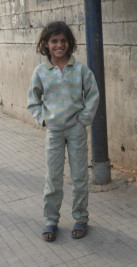
At the Entrance.
Victoria left us at the entrance of the Sabra and Chatila refugee camps in the hands of Mohammed. Mohammed and his sister are the sole survivors in his family from the 1982 Sabra and Chatila massacre.
At the entrance
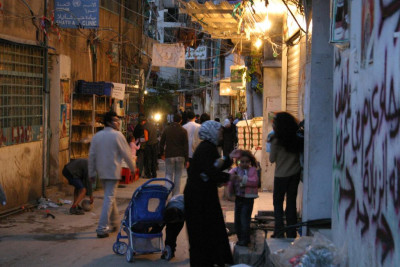
At the Sabra and Chatila Refugee Camps.
Palestinians refugees living in Lebanon can only work in the refugee camps. The camps are bounded, they can not expand their surface, so families grow their housing by adding a new floor every once in a while as a gift to newly-weds:
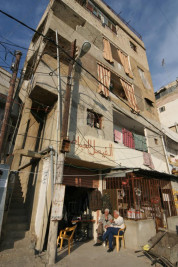
Vertical Growth in Sabra and Chatila.
In addition to the work restriction, new legislation in Lebanon forces palestinian families to sell any property they own to a Lebanese if the owner passes away, they can not keep the property.
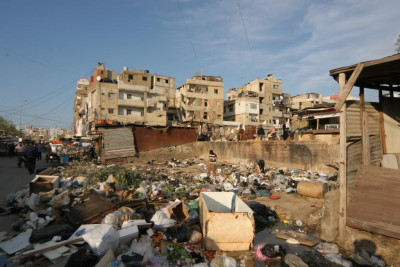
At the Entrance.
We accepted two tea invitations after much insistence, and we had dinner at Mohammed's place.
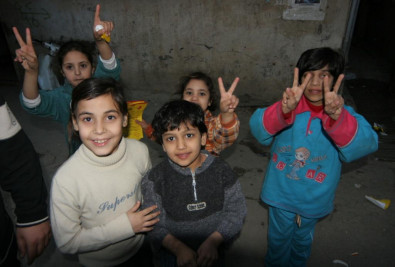
Palestinian Kids.
There is some limited internet connectivity in the camps, we saw one room where people were playing games and using the web, but no more than six computers.
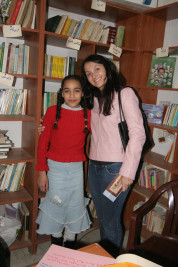
At the Palestinian Youth Center.
[1] Or something like that, dont remember the exact frequency.
Mono Updates
We are back in town from our trip to Lebanon.
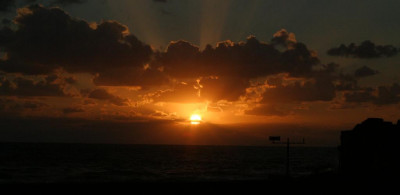
Sunset at Byblos.
Marek and Martin have completed two new features for C# 2.0: Nullable Types and Fixed Buffers. They will both be available as part of our upcoming Mono 1.1.5 release.
Dan has posted an update on Stetic. His update has a flash video that you can see.
Massi has posted a long explanation on how to improve Mono's SSAPRE implementation.
Posted on 18 Mar 2005
Daily Show
Spreading Irony Throughout the World.
A few articles
Mokhiber and Weissman's book On the Rampage: Corporate Predators and the Destruction of Democracy is a book with individual stories that illustrate the unbounded power of corporations today. A must-have companion for anyone who enjoyed the movie "The Corporation".
As a follow up, credit card companies are about to get an early christmas present with the new Bankrupcy Bill, coverage: Arianna Huffington and Molly Ivins.
Posted on 11 Mar 2005
More Tourism
My friend Mancha is teaching an entry-level computer course in my old school with Mono. He is currently using Monoppix as a distribution, but he would like to use a purely Gnome-based environment instead of the current mix of applications.
If anyone knows of a Gnoppix-like system with a full Mono suite please let me know.
In his latest blog entry Mancha details his adventures cleaning up his keyboard a must-read if you understand spanish.
Turkey, Lebanon and México
I asked my friend Mancha about the similarities between Turkey, Lebanon and Mexico. It turns out that there was a large immigration of Turkish and Lebanese people into Mexico, and they shaped the early Mexico City and they were easily distinguishable in the 1920s and 1940s.
The tacos-al-pastor which have their equivalents in Turkey and Lebanon did indeed originate in this side of the world and was exported to Mexico with the immigrants (the way its cooked is on a gigantic pile of meat). There are two big differences between the Turkish and the Mexican versions: the Turkish version is made with some kind of lamb meat, while in Mexico we use pork. In Turkey they simmer the meat on tomato sauce on top of a pita-like bread, while in Mexico adobo is used as a spice. They tend to serve this on a piece of bread, we use tortillas.
In Lebanon they wrap the taco for you: you do not have to do the wrapping yourself, it comes pre-wrapped. The tradition of the lemon juice is also used here, and just like Turkey they give you a small jar with lemon juice next with your meal. In Mexico we just leave lemons cut in pieces on the table.
Yesterday I did a presentation for the Lebanon Linux Users:
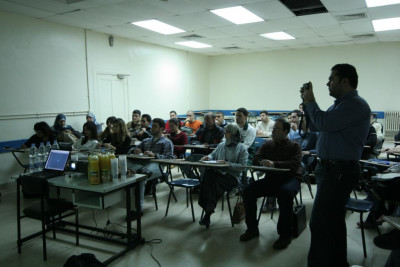
Lebanon Linux Users Group
We later went to Virgin Records in downtown to pick some books and movies, the anti-Syrian protest is camping right next to it, in Martyr's Square:
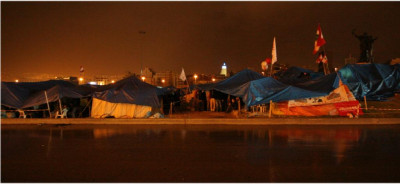
Anti-Syrian Camping Site.
At the Rafik Hariri's burial place, people have been leaving messages:
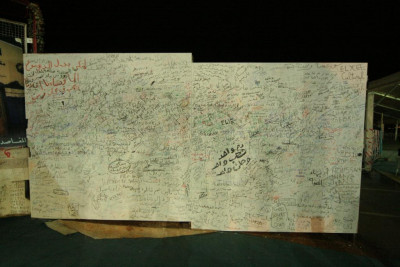
Messages
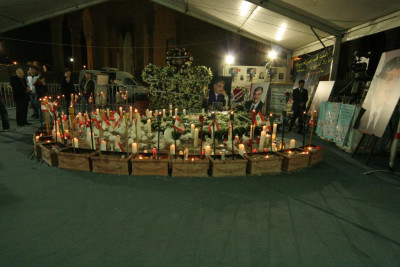
Burial Ground.
After dinner:
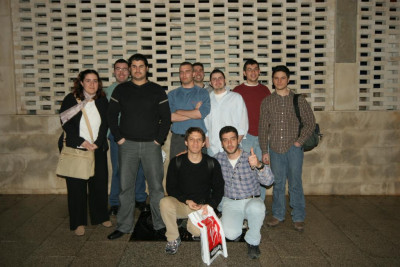
Lebanon Linux Users
Cooking with Camels
Dick Porter pointed me to a comment from the Daily Telegraph:
"Sir- Sandy Pratt's pollack recipe (Letters, Mar 9) brings to memory a suggested method for cooking camel meat, which I saw hanging in the Arab souk in Hebron some years ago. Take a lump of camel meat and a stone of equal size. Place in a large pot, bring to the boil and simmer gently. When the stone is tender, so will the camel be."
Everyone is Linking to This
Everyone is raving over this technology over at Planet Gnome: Colorization Using Optimization.
Posted on 10 Mar 2005
Tourism
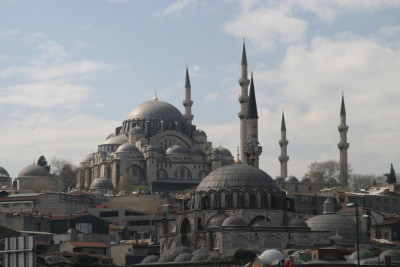
Istanbul
Had a great time in Istanbul, my hotel was conveniently located in a street in Beyoglu: packed with restaurants, coffee shops and tons of people walking up and down the street.
As usual, my plane got delayed and canceled so I lost my first day in Istanbul. Instead, I got to enjoy everything that the CDG airport has to offer: from toilets to airport food and ten euro per hour wireless internet access.
Currency in Turkey used to be measured in millions, but they have now removed six zeros from their currency:
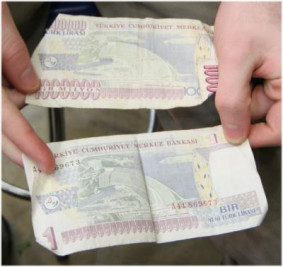
Currency
My first meal was here:
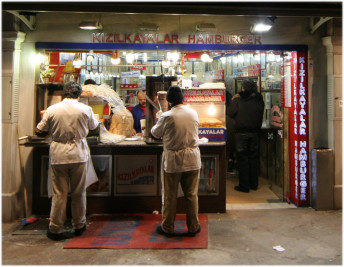
Kizilkayalar Hamburguer
Peter from Linux Tecnolojic, Pinar and Gamze from Novell Turkey:

Peter, Pinar and Gamze
Customs in Istanbul are surprisingly similar to those in Mexico City, to the smallest details. The most interesting one is that people put lime juice in most things.
My talk on Saturday was about Gnome and Mono. I showed a couple of applications at the end of my presentation, and I regret forgetting about showing Beagle. It would have been a nice demo.
While jetlagged one night, I finally figured out how to make the IBM T42p go into standby mode and recover from it without leaving the screen blank. To do this, just add "acpi_sleep=s3_bios" to your kernel command line.
Then the `powersave --standby' command will work. After the first time you standby, the powersave daemon seems to get stuck waiting for some helper process to finish, and wont work again. So am using a miggy-script of magic that does something like `powersaved restart', followed by some magic sleep command, followed by the standby command.
The last day of the conference we had a big dinner with the Gnome Turkey group, here are some of the members:
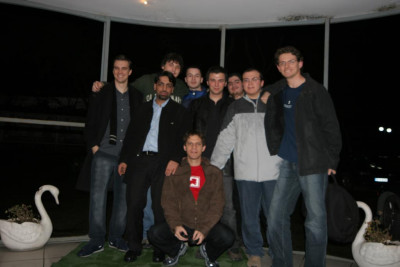
Gnome Turkey group
On Sunday we went for a walk: Enver and Sezgin were my guides. Just like Mexico, they sell very cheap freshly squeezed orange juice on the streets:
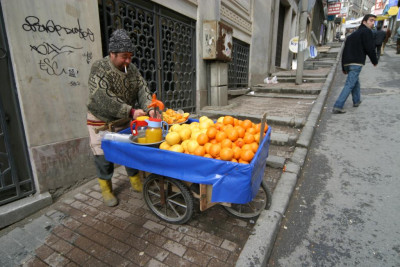
Orange Juice
The Blue Mosque entrance:
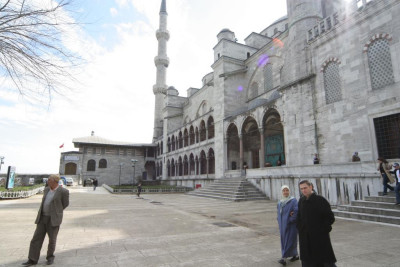
Blue Mosque
Hagia Sophia, the church turned mosque, just in front of it:
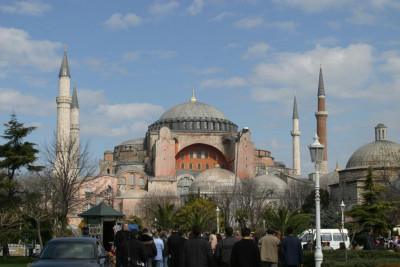
Hagia Sophia.
Next to those two mosques, visitors can visit the underground roman cisterns:
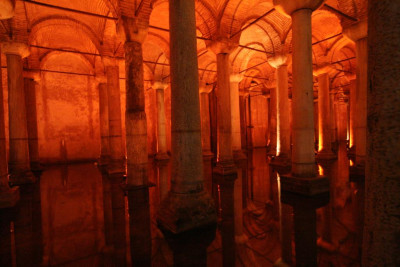
Roman Cistern.
Beirut
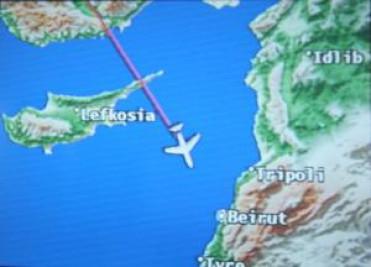
In Transit
I arrived last afternoon to Beirut from Istanbul, a very short flight, only one hour and thirty minutes. I went straight to sleep as the couple of days that I spent on Istanbul were intense.
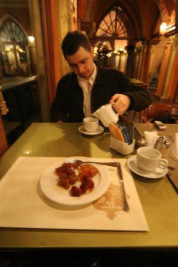
White Coffee
Later in the afternoon, Hisham from the Lebanese Linux Users Group picked me up and we went for a walk of the city. The stores that you find in Beirut are very much like those you would see in any other major city: Body Shop, Starbucks, McDonalds, Zara, KFC and even a Buddha Bar; All the big names car dealerships, hotels and so on. The only difference is that you can only read half the signs.
They sell a thing called "White coffee" which I enjoyed very much, and it is just transparent water with some flower-like flavor.
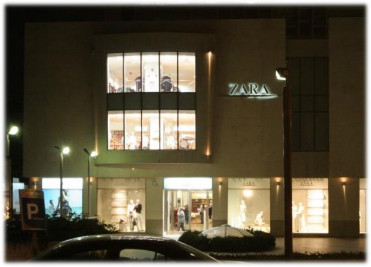
Zara Beirut
I woke up very late this morning, recovering from the jetlag. In the reception, people were watching the pro-Syrian gathering in down town Beirut, which looked huge, and clearly was the place-to-be today. Now I can have a better story to tell next time the question of `Where were you the day of the pro-Syrian demostration in Beirut?' pops.
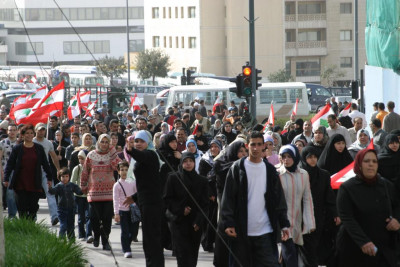
Walking to the Etoile.
The taxi dropped me off about a kilometer away from Place de L'Etoile where the event was happening. Most roads were closed to cars.
Just like in Turkey, people are incredibly friendly, and they would try very hard to speak to me in either english or french. One of those guys volunteered to translate the signs and what people were saying over the loud speakers, and hanged out with me until the end of the day. Just like in Barcelona one in every five people you meet is a Jordi, in Beirut the same happens with the Mohammeds. I have met three so far.
Hizbolah called for today's protest, it was a protest in support of Syria and against resolution 1559. Hizbolah is a popular resistance movement that emerged in Lebanon as a reaction to the Israeli invasion of 1982. Although Israel withdrew from Beirut, the army remained in occupation of the south of the country. The resistance eventually drove the Israeli army out of Lebanon in the year 2000.
Hizbolah grew out as a resistance movement, but today is also a political player and has a few seats on congress.
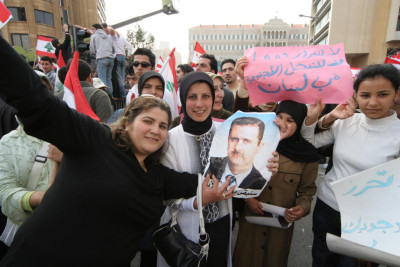
At the event.
People in the city told me that the 1559 not only called for Syria to back out, but also for the Hizbolah militia to be disarmed. Me, being scared of anything remotely looking like a weapon could not agree more, but let me explain.
Although the 1982 invasion was aimed at neutralizing the growing strength of the PLO as a political force instead of conquering Lebanon, those at the protest today do not necessarily see it that way. They repeatedly said that Hizbolah keeps Israel away from Lebanon (Here is the Reuters coverage).
Syria entered Lebanon for the first time invited by the then president of Lebanon and by a mandate of the Arab League, to stop the civil war that had erupted in Beirut. They got themselves tangled into the civil war, and were basically powerless to stop the invasion in 1982. They have remained ever since and its the source of the current split opinion.
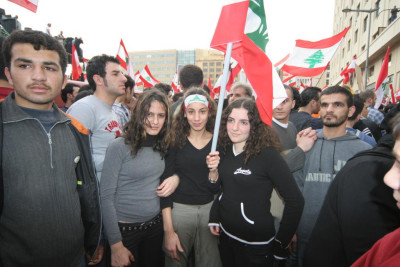
At the event.
The protest was like any other protest I have been to; you could smell some marijuana being burned, people with tons of signs everywhere, fairly packed, difficult to navigate and people chanting slogans. All I could understand was `Yala, Yala', which roughly means `Go go'.
I could not reach the center. All of a sudden, it turns out that just next to where I was standing they were setting up the podium for the main speaker. In a building barely twenty meters away. First soldering it, and covering it up with a white blanket of sorts:
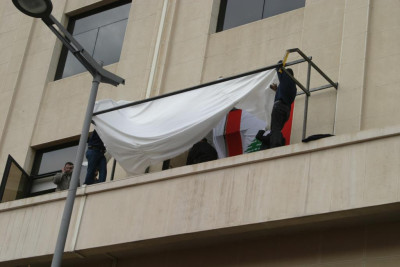
Podium
Half an hour later the main speaker showed up:
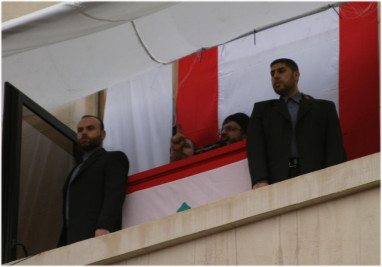
Speech
After the event was over, I was invited to dinner and to play pool. I had some tasty thing that is very much like a Taco al Pastor in Mexico, but they use bread instead of tortillas. Not only they did not let me pay anything (at the pool place, the dinner, the taxis), they also paid for my taxi to return to my hotel. I also got an invitation to see my now friend Mohammed in the south of Lebanon once Maria arrives:
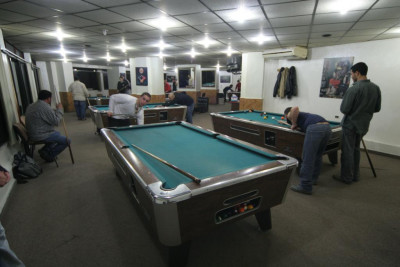
Pool
Like in Turkey, the way to cross the street is to wait for a space between the cars and to jump into the street, hoping that the car will stop. Only later in the day I noticed that this was not like Mexico, where people do this when they see no cars coming. In Beirut there are no traffic lights (or at least I have not seen any so far).
This pricing picture at the pool place probably gives you a taste of the city:
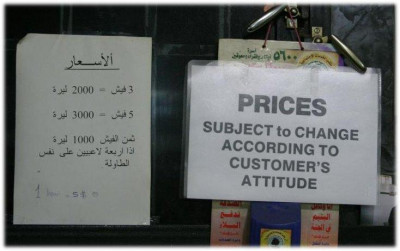
Pricing
Maria Laura
Maria's flight to Beirut is delayed; She will be showing up later in the afternoon. This means that my Gnome/Mono presentation will have a hard-stop at 6:30pm.
F-Spot
Currently F-Spot nor ImageMagick on my machine have support for RAW images. I made the mistake of shooting about 20% of my photos with that, so am going to have to wait until I get back to figure out how to decode them.
Posted on 09 Mar 2005
Mono Awards
Kevan Barney just pointed me out to this award that Mono received from Developer.Com's 2005 Products of the Years: .NET Tool/Add-in of the Year and also the reference on the article ``.NET Ecosystem is a Wonderful Place''.
Congratulations to all the Mono developers!
Robert Fisk
As I was preparing my presentation for this afternoon at the University, I got a call from Robert Fisk, which just arrived in Beirut. Laura and myself will be having dinner with him later in the week.
Robert Fisk wrote the book Pity the Nation which is the best book I have read in the last year. Not only its packed with hundreds of stories of people during the war in Beirut.
Gonzo but not Forgotten
George McGovern, presidential candidate in 1972, wrote about Hunter Thompson.
Posted on 05 Mar 2005
Web Site Migration
Today we officially jumped into the Wiki bandwagon and switched the Mono web site from the old framework to use MediaWiki (the Wiki engine that powers the Wikipedia).
Thanks go to Nat who helped me migrate the content and also is hosting our Wiki server on the same machine as his Hula web site.
Posted on 03 Mar 2005
Blog Search
Archive
- 2024
Apr Jun - 2020
Mar Aug Sep - 2018
Jan Feb Apr May Dec - 2016
Jan Feb Jul Sep - 2014
Jan Apr May Jul Aug Sep Oct Nov Dec - 2012
Feb Mar Apr Aug Sep Oct Nov - 2010
Jan Feb Mar Apr May Jun Jul Aug Sep Oct Nov Dec - 2008
Jan Feb Mar Apr May Jun Jul Aug Sep Oct Nov Dec - 2006
Jan Feb Mar Apr May Jun Jul Aug Sep Oct Nov Dec - 2004
Jan Feb Mar Apr May Jun Jul Aug Sep Oct Nov Dec - 2002
Jan Feb Mar Apr May Jun Jul Aug Sep Oct Dec
- 2022
Apr - 2019
Mar Apr - 2017
Jan Nov Dec - 2015
Jan Jul Aug Sep Oct Dec - 2013
Feb Mar Apr Jun Aug Oct - 2011
Jan Feb Mar Apr May Jun Jul Aug Sep Oct Nov Dec - 2009
Jan Feb Mar Apr May Jun Jul Aug Sep Oct Nov Dec - 2007
Jan Feb Mar Apr May Jun Jul Aug Sep Oct Nov Dec - 2005
Jan Feb Mar Apr May Jun Jul Aug Sep Oct Nov Dec - 2003
Jan Feb Mar Apr Jun Jul Aug Sep Oct Nov Dec - 2001
Apr May Jun Jul Aug Sep Oct Nov Dec